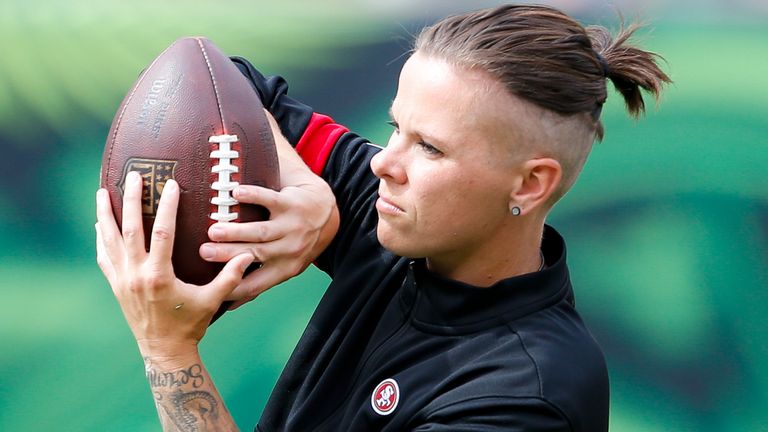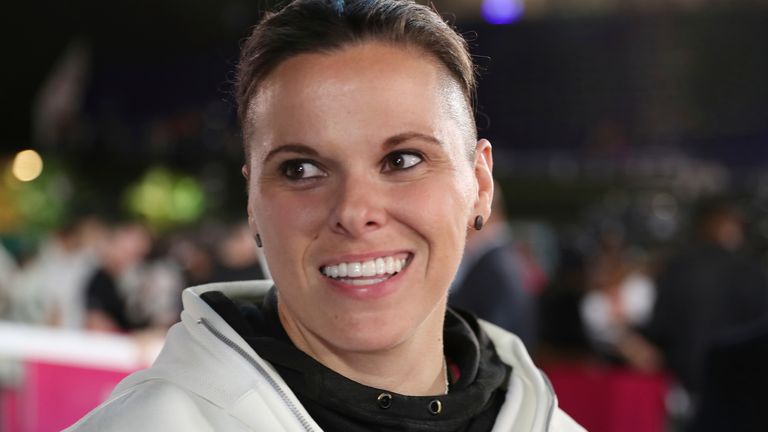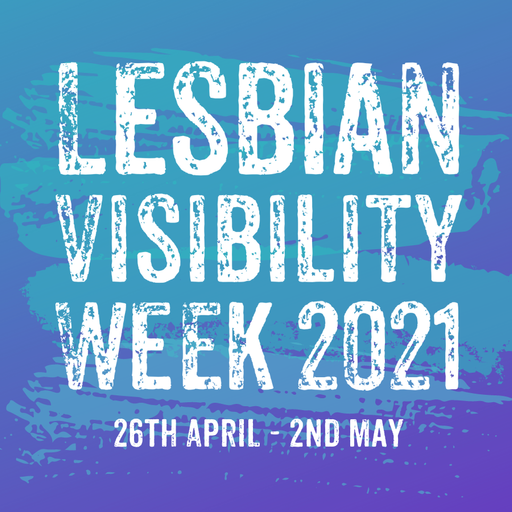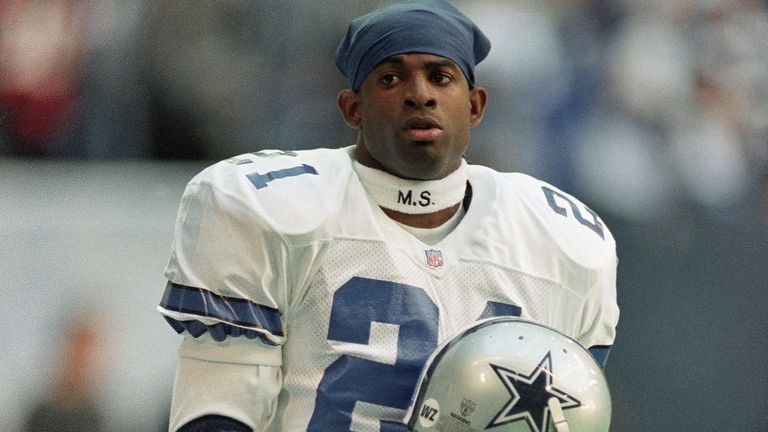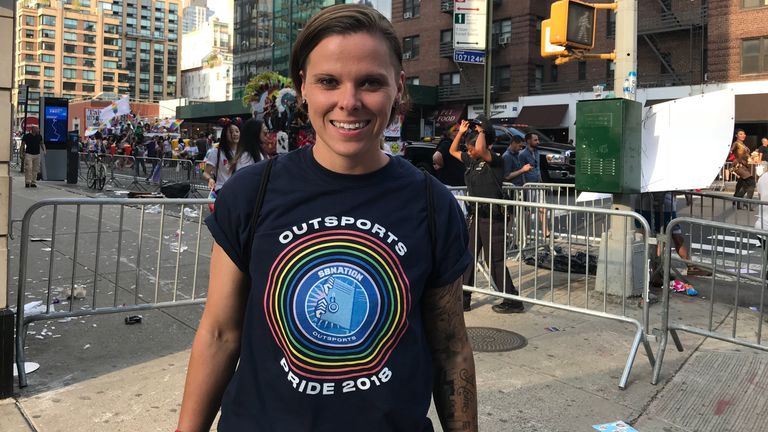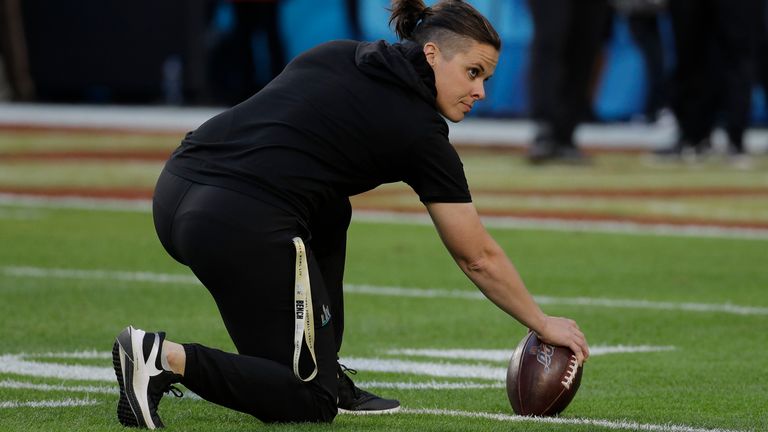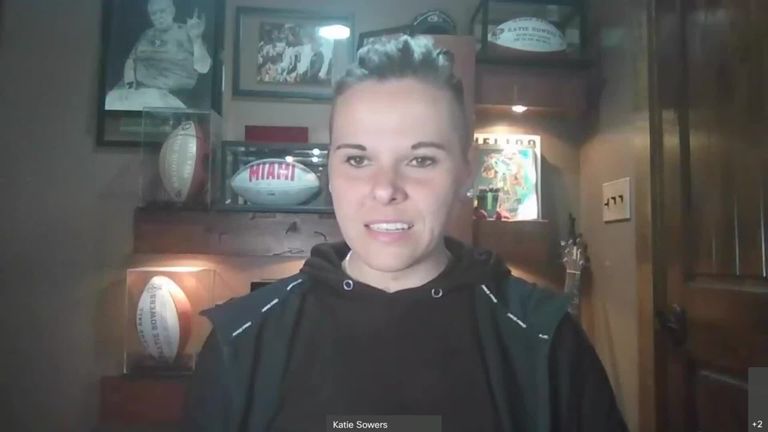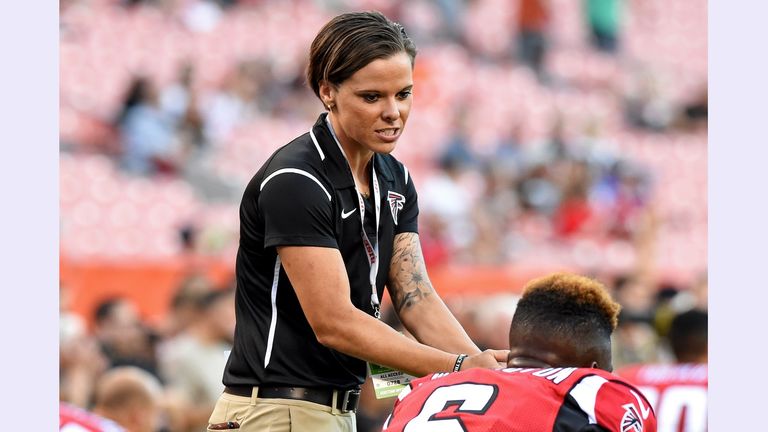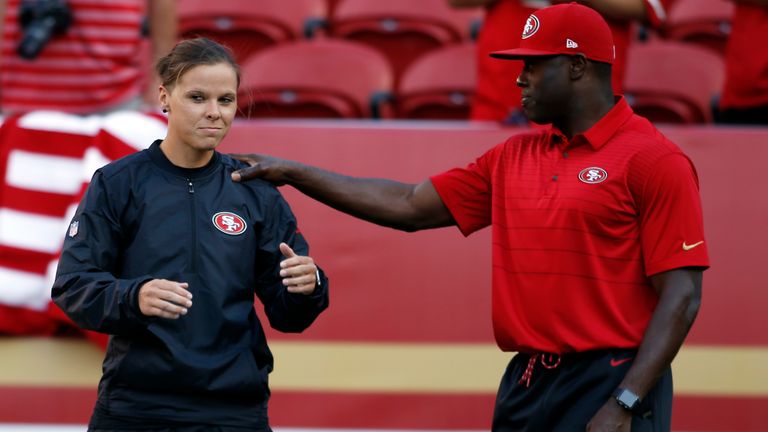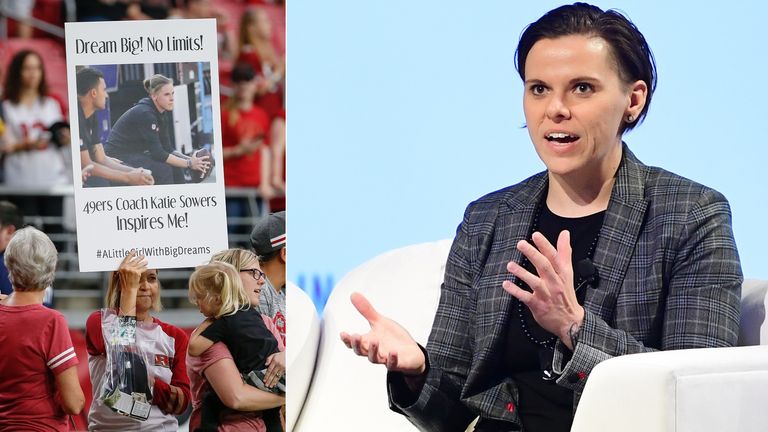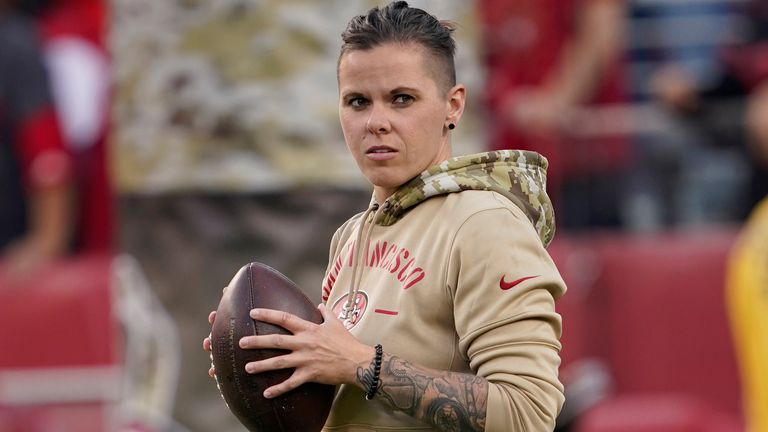Katie Sowers: History-making NFL coach on overcoming rejection, reaching the Super Bowl, and being an LGBTQ+ role model
As the first woman to coach in the Super Bowl, Katie Sowers made history with the San Francisco 49ers in 2020; on Lesbian Visibility Day, she describes an early career setback relating to her sexuality and discusses being a role model in sport for women, girls, and the LGBT+ community
Monday 26 April 2021 13:28, UK
Walking out into a media scrum on Super Bowl week's Opening Night in Miami, Katie Sowers felt the significance of the moment - not just for herself, but for women and girls in sport.
With Sowers about to become the first woman to coach in a Super Bowl, there had already been plenty of 'history maker' headlines and interview requests. Now she could see evidence of the scale of the interest, with even star names from her San Francisco 49ers family less in demand from reporters.
"I didn't realise how big it was until that media night," says Sowers, reflecting on her time in the spotlight. "I was wondering why everyone was swarming around me and not talking to some of these other guys!
"But it was that idea of how important it is to be visible."
Among those putting questions to her was two-time Super Bowl winner Deion Sanders. Back when he was playing cornerback for Dallas, Sowers was a football-mad girl growing up in small-town Kansas who would write fan letters to her Cowboys idol.
"I'd always wear Deion's jersey when I was younger, in elementary school. So it was almost like these two worlds - the younger self and the dream of what I wanted - came together, when I got to meet him on that stage. It was really cool. That's going to be a memory that I remember forever."
Now back in her home state, she is discussing her career at a special Q&A event being held by the LGBT+@Sky and Women@Sky network groups in advance of Lesbian Visibility Day. Sowers came out publicly in 2017, meaning her Miami milestone was also a breakthrough for the LGBTQ+ community in sports. In her early 20s, she once experienced an incident of discrimination due to her sexuality.
The rejection strengthened her resolve, igniting authenticity in the trail she would go on to blaze.
Sowers had shown a flair for organisation since childhood, when she would compile lists alongside twin sister Liz of the neighbourhood kids who would be free to play football after dinner on Sundays. Sanders and another Cowboys legend, Troy Aikman, were among the heroes they would emulate, and pop culture provided relatable players such as the characters in the 1994 movie Little Giants about two rival Pee-Wee teams. "There was a girl on one of the teams and they called her 'Icebox'. I think I saw myself as 'Icebox' or maybe I wanted to date her, I'm not quite sure!" laughs Sowers.
The girls' father Floyd was a college basketball coach, adored by his players and more widely in their Harvey County community just north of Wichita. He passed away last summer aged 72; a local obituary noted how he was "also a feminist - a 'girl dad' long before Kobe made it cool. He encouraged his daughters to do anything they wanted to do and be anything they wanted to be." Through watching him, the young Katie was both inspired and instructed.
"He showed me how a coach is more than just X's and O's - a coach is a leader of people making people better on and off the field. You could see the way his team loved and cared for him." He had suffered a stroke in 2018 that left him unable to walk or talk - the family learned sign language to help improve his quality of life. "He was my biggest fan. He got me into that love of what coaching means, outside of just winning."
Sowers cites both her parents as her personal role models, noting how they raised three girls to be confident in the knowledge that they did not have to go along with the 'status quo' (the twins' elder sister Stephanie is a partner at a major Kansas City law firm). Yet back in the late 2000s, inclusion was not as appreciated or understood as it is now, and Katie took a knock-back that would ultimately shift her onto a different track in sports.
At the conclusion of a successful basketball scholarship at Goshen College in Indiana during which she had been team captain, Sowers was an obvious candidate to stay on in a volunteer assistant coach role. However, by this time she had also come out to friends and family, and it transpired that some parents had voiced 'concerns'.
"At the time, the school didn't even allow professors to be openly gay," she explains.
"There was a school in our Conference that we played against regularly. I had a friend on the basketball team, and they got 'caught being gay' - that's how they explained it at the time - and my friend was kicked off the team. That's what I was used to growing up."
When Sowers went to speak to her coach to learn about her own future, she was told it had been decided she should not be around the Goshen team.
"I remember leaving his office and feeling very hurt and angry. I called my mom right away - she's the most positive person, but she was in tears. She was crying and saying, 'this is not OK, and I'm so sorry you're going through this'.
"It was a moment where I decided I can either look back and try to open this door that was slammed in my face, or I can view what other opportunities are out there. I believe that led me onto the path to where I am today.
"If that wouldn't have happened, I might have been coaching the second sport that I love. But instead, that door slamming in my face, I view it as an opportunity where I was able to see much more about life."
The then 22-year-old graduated with a degree in physical education, and rekindled her passion for football, playing in the newly founded Women's Football Alliance - a league that embraced diversity from the start. Years later, Sowers would share the story of what led to her leaving Goshen, where a welcome U-turn in attitudes has since taken place.
"That school has now changed its policies," she says. "They have openly apologised for that. It was a learning experience for everyone. When we feel discriminated against, a lot is due to the ignorance of others. And the more anger and hatred we hold towards those people, it's not curing any of that ignorance."
After Goshen celebrated Sowers' Super Bowl achievement and formally said sorry to her in a statement released last January, she responded gracefully and acknowledged how the anti-gay snub had caused a "roadblock" in her journey that she was able to navigate around. By 2013, she was proudly representing her country at the IFAF (International Federation of American Football) Women's World Championship, a fledgling tournament that was understandably US-dominated but still marked a crucial advance for the sport.
Twist of fate leads to Falcons chance
Having seen one coaching door closed in her face, another opened unexpectedly in Kansas City when she was asked to take charge of a fifth-grade girls' basketball team. One of the players' fathers was experienced NFL executive Scott Pioli, and recognising Sowers' football strengths, the two forged a friendship. "You never know when you're making a connection or creating a relationship that's going to change your future - so always make sure you're the best version of yourself.
"He got to know me and a couple of years later, he helped me get a foot in the door with the Atlanta Falcons." Sowers was a beneficiary of the Bill Walsh Diversity Coaching Fellowship - only the second woman in the program's history - and joined the Falcons as a wide receivers coaching intern in 2016.
Any trepidation she might have had about moving into men's sports faded fast. "What I found was that most of my biggest supporters were the players.
"They had been taught and led by women, and had no problem listening to women. For a lot of them, the main role models in their life were women." The camaraderie came naturally - she fondly recalls her 30th birthday when Julio Jones surprised her with a cake and celebration - while her communication skills and eye for detail were evident to her colleagues.
When Kyle Shanahan left Atlanta to become head coach of the 49ers the following year, he asked her to head to the west coast to continue her Fellowship. Within weeks, she had accepted the offer of a full-time assistant coach position.
That same rapport with players came easily in San Francisco too. "They became a second family to me. They'd come to my office to chat, or to annoy me! I also found I was the one who players would come to when they were injured, a lot more than the male coaching staff. They were open with me about stuff that they felt they might be judged or evaluated on by others. But I think that's what diversity brings, and it helped my relationship with them."
Just before the 2017 season began, Sowers gave an interview to the website Outsports in which she discussed her sexuality publicly for the first time, thus making her the NFL's first out gay coach. She explained how she wanted to be visible because she had always felt accepted in football, but that she knew others in the sport who were also LGBT+ and who felt uncomfortable at the thought of coming out.
"I knew that me being gay, that was just part of who I was," she says, reflecting on how she felt four years ago. "I didn't want to have to hide if I was dating somebody. If I did hide that part of me, I would hold myself back from allowing other people to get to know me.
"One thing I've learned is that if you're struggling with being authentically you, you're not only cutting yourself short, you're also cutting off this door that allows other people to get to know you.
"As LGBT+ people, we all have to handle whether we come out or how we deal with being authentic in our own way, and when we're ready. The more that you can strive to get to that point, the better version of yourself that you'll see."
Two months prior to Sowers, the former New England Patriots and Kansas City Chiefs tackle Ryan O'Callaghan had also come out as gay, and together they supported the NFL's first participation in New York Pride in June 2018. Their representation has helped move the dial on inclusion, encouraging allies to be active in their support and giving the League the confidence to be bolder too.
"After my article came out, I had players come by and share about someone in their family that was gay and how much that article had meant to them. These players, they're more open to this than sometimes we might think or stereotype them.
"We do still have a long way to go - we don't have a prominent player that's out right now. But I do see that changing soon and when that happens, we'll start seeing more active players showing who they are too, and really how their team-mates rally around and support that."
Achieving and believing
Sowers' time with the 49ers began inauspiciously but the addition of Jimmy Garoppolo sparked a turnaround and hopes were high going into 2018 - only for the quarterback to suffer a season-ending ACL injury in Week Three. It took some of the pressure off for 2019 and the team responded blisteringly, going 13-3 in the regular season before seeing off the Minnesota Vikings and the Green Bay Packers to reach their first Super Bowl in seven years.
Sowers may have allowed herself that one 'gulp' moment when she spoke to Sanders on Opening Night amid the TV cameras and flashbulbs, but she otherwise took it all in her stride, including owning that trailblazer tag.
"I never started out because I wanted to be a headline. I always just wanted to be a coach," she says.
"It's more about this idea that you don't want to strive to be the first, you just want to make sure you're not the last. The first is important, but it's more important that we have a second, third, and fourth."
She mentions her former Team USA room-mate Callie Brownson who is Chief of Staff at the Cleveland Browns, and the Tampa Bay Buccaneers coaching duo Lori Locust and Maral Javadifar who succeeded her in getting to the Super Bowl this year. "It's just cool to have a network that continues to grow. I saw it from a time when there was nobody in the room that looked like me to now seeing women all over the place. It's getting there."
Losing to the Chiefs at Hard Rock Stadium is a somewhat painful memory but there is more to the experience than just the result. An encased, souvenir mini football with 'Miami' written on it sits prominently behind Sowers as she speaks. "You do want to be grateful for how far you've come - having the ability to do something that not many people have ever, or will ever, be able to do."
She returned to the Sunflower State in January 2021 to be closer to her mother Bonnie and the rest of her family - she has been assisting Liz. who is head coach of the women's flag football program at Ottawa University, south-west of Kansas City. This non-contact version of the game is rapidly expanding across the US and the Sowers twins are cheering it on. "It's actually a game of more intricate passing, and it's faster-paced," says Katie. "It's really up and coming and I would not be surprised to see it as an Olympic sport in the near future."
Now 34, she still harbours ambitions to be a head coach in her own right one day - and there are no limitations on that. "I'm not saying my NFL days are over. There's a possibility even this year that I might be back." When asked a question by an audience member about where the Chiefs' Patrick Mahomes would place in the G.O.A.T. rankings, she confirms his 'Baby G.O.A.T.' reputation enthusiastically before adding: "I think he has a lot to prove still. I might be able to tell you more in depth in a few months, we'll see..."
She smiles cryptically, clearly excited about what the future might hold. The Super Bowl was a stand-out chapter, but so much of Sowers' story is still to be written. What matters most to her is that it fuels the imaginations of girls, like a 'choose your own adventure' book, or a movie where you can see yourself in someone else's shoes, or a footballer's cleats, or even Icebox's sneakers.
What would be the moral of the tale? "View the world through a different lens than what we've learned. My example is my niece. We were driving one time, she was about four, and we pointed out some boys playing football. She looked at us and she said, 'boys don't play football'. And I realised all she'd ever seen was my twin sister and I playing.
"Now she's what some might call a 'stereotypical' girl - she likes the colour pink, she likes ballet - yet she believed that only girls played football.
"It just goes to show you how what we teach our children changes their view of the world. We actually had to teach her that boys could play football with girls as well."
Be open to opportunity, outmanoeuvre the obstacles, believe in yourself - it's solid advice for receivers, and Coach Katie speaks from experience.
Lesbian Visibility Week runs from Monday, April 26, to Sunday, May 2.
Sky Sports is a member of TeamPride which supports Stonewall's Rainbow Laces campaign. Your story of being LGBT+ or an ally could help to make sport everyone's game. To discuss further, please contact us here.
